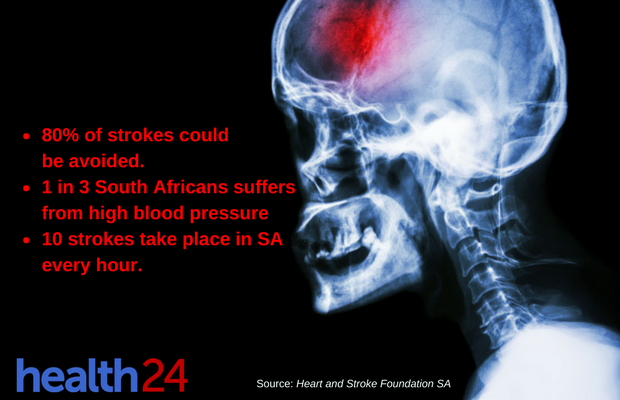Health24.com | ‘Stroke is everybody’s issue’ – a survivor’s story
World Stroke Day is celebrated to raise awareness of an often fatal experience. Strokes can, however, be avoided.
According to the Heart and Stroke Foundation South Africa, 10 people in South Africa have a stroke every hour. In addition, one in three South Africans suffers from high blood pressure, which is a major risk for stroke.
Suzan’s story
A stroke can literally be described as a “brain attack”, where the blood flow to the brain is temporarily cut off or limited. This causes a lack of vital oxygen and nutrients to the brain, causing cells to die within minutes.
Although not all strokes result in death, they can change lives forever. In 2010, Suzan Raphuti-Letsoalo from Atteridgeville, Pretoria, suffered a haemorrhagic stroke following the birth of her youngest child.
She spent close to a month in a coma. When she woke up, she was unable to walk, use her arms or speak. The former social worker and mother of three suddenly had to face drastic changes in her life.
As if taking care of a newborn baby wasn’t challenging enough, she also had to relearn to walk and talk during that time. She underwent intense rehabilitation – and to the great surprise of her doctors she recovered. The fact that she regained her speech and movement was a pure miracle.
Suzan was unable to return to work after her ordeal, but made use of the few resources she had to create a support system for other stroke survivors in her area.
“To me, after this ordeal, stroke is everybody’s issue right now,” says Suzan. “It’s not only an issue for stroke survivors and their families – a stroke can attack everybody and it knows no age.”

Know your numbers
Suzan’s support group is called Stroke Tamara, and aims to teach people about the dangers of a stroke and the importance of acting quickly in an emergency. In the lead-up to World Stroke Day, Stroke Tamara partnered with Angels Initiative to create and raise awareness of stroke at the Bara taxi rank in Johannesburg.
Here, people are receiving information about strokes – they can also get tested for high blood pressure, which is one of the main risk factors for stroke.
“Know your numbers – your blood pressure, your glucose levels,” says Dr Shanil Naidoo from the pharmaceutical company Boehringer Ingelheim. He says if you know that you have high blood pressure for example, you will know that you are at high risk of having a stroke and can do something about it.
Prof Feroza Motara, Head of Emergency Medicine at the University of Witwatersrand, states that the Angels Initiative was adopted to raise awareness of stroke, not only for World Stroke Day, but to improve treatment, facilities and the capability of handling acute strokes in general.
“Ordinary citizens are essentially the ‘first responders’ when a stroke occurs. If they are able to act with certainty and speed to secure emergency treatment, we can save many lives and reduce the severity of long-term damage,” she said.
Lower your risk
You can lower your risk for a stroke by taking the following measures:
- Follow a balanced lifestyle: eat healthy and exercise regularly.
- Get your blood pressure and blood sugar tested regularly.
- Cut out salt.
- Consume alcohol sparingly and quit smoking.
Image credits: iStock and supplied

